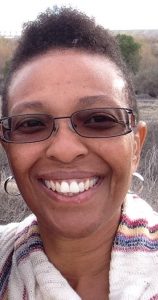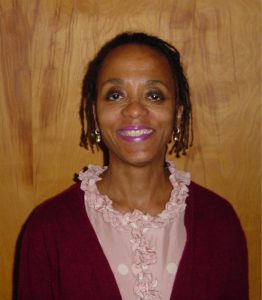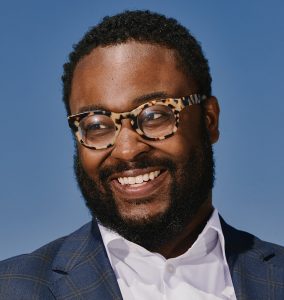Featured Image Courtesy Mary Plummer for KPCC & Artist Elliott Pinkney
Advocating for African American and Black Heritage
Free Online Forum: Advocating for African American and Black Heritage
Heritage conservation often requires engagement with difficult moments in history and, indeed, actions happening outside our own doors. The California Preservation Foundation is committed to making changes in our profession, seeking full inclusion for communities of color.
In the coming months, we are hosting a series of online conversations to address existing inequalities in our field and question disparities in the recognition of significant historic sites that were designed by or served African American communities, including housing, recreation, cultural centers, and schools. The series will begin on June 22, from noon to 1:00 p.m. Pacific time. All programs in this series will be free for the public and recorded to ensure wide access.
View past free programs on our Facebook video stream or the CPF YouTube Channel.
Part 1 - Housing & Community Culture - Monday, June 22 - 12 to 1 PM Pacific
The program includes discussion with and presentations by:
- Rita Cofield, member of the CPF Board of Trustees and an advocate for the preservation of a 1969 cultural center in Watts that housed the Mafundi Institute, designed by Arthur Silvers, an African-American architect
- Amanda Seward, an attorney and advocate for Lincoln Place in Venice Beach, a 38-acre 1949 garden-style apartment complex that is now listed on the California Register of Historic Resources and National Register of Historic Places and designed by architect Heth Wharton and pioneering African-American designer Ralph Vaughn.
Speakers

Rita Cofield received her BA in Architecture and Planning from Howard University and is currently working on fulfilling the requirements for the Masters in Heritage Conservation from the University of Southern California. She free-lances as a cultural resource manager and Public Historian with valuable experience in community-based projects. She is passionate about finding ways to re-insert multiple perspectives into the larger narratives of our history. She enjoys activities and projects that foster innovation when it comes to caring for historic resources in underserved neighborhoods. She also feels a moral responsibility to expose the youth in her community of Watts to preservation education, hands-on training in building conservation, and its rich history as a means to community engagement and pride. Rita is a member of the CPF Board of Trustees and an advocate for the preservation of a 1969 cultural center in Watts that housed the Mafundi Institute, designed by Arthur Silvers, an African-American architect.
 Amanda Seward is an attorney in private practice, with a background in media and entertainment law, having worked for Warner Bros., Hanna Barbera, Turner Network Television and CNN. She initially got involved in local planning issues as a volunteer with the Los Angeles Conservancy Modern Residential Committee, working to save several local historic landmarks. She is a resident of the Gregory Ain Mar Vista Tract, the first post-World War II historic district in Los Angeles. She led the multi-year preservation battle to save Lincoln Place, a 791-unit garden apartment complex in Venice. It was through this nomination that she learned of the plight of the tenants and ended up representing senior and disabled tenants in the eviction cases brought against them.
Amanda Seward is an attorney in private practice, with a background in media and entertainment law, having worked for Warner Bros., Hanna Barbera, Turner Network Television and CNN. She initially got involved in local planning issues as a volunteer with the Los Angeles Conservancy Modern Residential Committee, working to save several local historic landmarks. She is a resident of the Gregory Ain Mar Vista Tract, the first post-World War II historic district in Los Angeles. She led the multi-year preservation battle to save Lincoln Place, a 791-unit garden apartment complex in Venice. It was through this nomination that she learned of the plight of the tenants and ended up representing senior and disabled tenants in the eviction cases brought against them.
In 2003, she was elected to the Mar Vista Community Council Board of Directors. Later, she was elected to the Venice Neighborhood Council.
Ms. Seward received her J.D. from Georgetown University Law Center and received her B.A. in philosophy from Spelman College. She is a member of the State Bar of California and State Bar of Georgia.
View this program on our Facebook video stream or the CPF YouTube Channel.
Part 2 - Documenting Sites of Social Justice - Monday, June 29 - 12 to 1 PM Pacific
Part 2: Documenting Sites of Social Justice
To register for this program, visit the registration form here
"Map the Moment" - An Introduction to Using Photogrammetry Technology to Document Protest Sites
Thousands of people across the United States have taken to the streets to protest police brutality and demand change to the systemic racism that has been a part of this country since its founding. As history unfolds in our communities, racial justice, outrage, solidarity and change are reflected on buildings and the streets of our cities. The physical evidence of this historic groundswell, from broken shop windows and barricades, to graffiti, murals and impromptu memorials, is ephemeral as the system already works to erase these interventions in our urban fabric. A few of us at CyArk, a nonprofit organization dedicated to the digital preservation of cultural heritage, have decided to document this moment in our local community in Oakland.
Although the proliferation of cell phone videos and digital photography provides a better picture than ever of these protests, we believe in the power of 3D documentation to provide a holistic sense of place, helping compliment and place this other media in context. Our hope is that this documentation becomes a record for posterity and a canvas for future storytelling about the events that have transpired in cities across the United States.
This short online training session will go into the basics of digital documentation using a DSLR camera to create detailed three-dimensional models of sites of social justice, which often are temporal and difficult to preserve in physical form. This documentation will serve as a record that can also be used to tell the nuanced stories of these events in each city.
We will close this program with a discussion about the possibilities of this technology in how the data can be utilized for interpretive purposes, in archives, and other public outreach channels.
Speakers
Avidan Fernandez, Field Capture Specialist, CyArk. Avidan studied architecture and holds a B. Arch degree from California State Polytechnic University at Pomona. As a Field Capture Specialist, Avidan works on-site to document and capture high-resolution data sets utilizing both photogrammetry and LiDAR technology. He is responsible for organizing, cataloguing, and verifying data sets daily to ensure quality.
Kacey Hadick, Director of Project Development, CyArk. Kacey is an archaeologist and manages CyArk’s heritage programs around the world. Kacey interfaces with the cultural heritage community on behalf of CyArk and has led workshops in Lebanon, Peru, Chile and Armenia. He works to ensure that the products CyArk creates can be used in active conservation and preservation initiatives. As a program manager he is involved from initial site scoping to project completion and delivery of products. Kacey received his BA in Archaeology from the California Polytechnic State University, San Luis Obispo and a Master’s in World Heritage Management and Cultural Projects for Development from the University of Turin.
Whitney Peterson, Program Coordinator, CyArk. Whitney is an anthropologist who specializes in research of museum and heritage sites. Before joining CyArk, Whitney worked for the National Park Service doing work in historical interpretation and cultural resources. She holds a Master's degree in Anthropology from the University of Denver.
View past free programs on our Facebook Video or YouTube channels.
Part 3 - Curating Culture in the African American Context - Monday, July 13 - 12 to 1 PM Pacific
Part 3: Curating Culture & Humanities in the African American Context
To register for this program, visit the registration form here
Public historian, museum curator, professor and writer, Tyree Boyd-Pates will share his insights into including African American heritage and culture in mainstream museum exhibitions. Tyree has been involved in a wide variety of projects that delve into the African American experience in the U.S., including the social unrest of the Civil Rights Movement, African Americans in film, the history of gospel music and hip hop fashion, and more.
 Tyree Boyd-Pates is a dynamic history curator, professor, writer, and speaker who expounds on Black culture from a millennial vantage and mobilizes communities of color through journalism, social media, education, and history.
Tyree Boyd-Pates is a dynamic history curator, professor, writer, and speaker who expounds on Black culture from a millennial vantage and mobilizes communities of color through journalism, social media, education, and history.
With his work featured in The New York Times, Vogue, The Hollywood Reporter, Fast Company, Fortune Magazine, The Los Angeles Times, and other media outlets, Tyree's groundbreaking history exhibitions have inspired thousands to visit museums and engage with history anew.
View past free programs on our Facebook Video or YouTube channels.
Free Recordings on Inclusion & Equity from the CPF Vault
Free Recordings from the CPF Vault
- It takes a community - the importance of community driven historic context statements by Michelle Magalong, Rosalind Sagara, and Desiree Smith
- Lessons Learned from Advocacy Victories by Amanda Seward about the Lincoln Place Apartments
- The Historic Home of Memphis Slim and the Relationship Between Integrity and Condition - By Allison Lyons
- Environmental Justice and Consultation by Brittani Orona
- "It's important to remember what started it" - Conserving Sites and Stories of Racial Violence in Los Angeles, 1943-1992 by Jackson Loop
